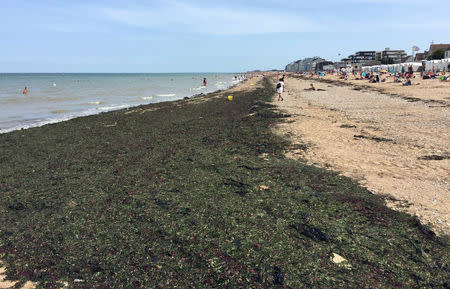Normandy's D-Day beaches invaded by green algae

By Geert De Clercq COURSEULLES-SUR-MER, France (Reuters) - Normandy's D-Day beaches, where Allied troops landed in June 1944 to free Europe of Nazi occupation, are being invaded by green algae. Beaches such as Omaha and Juno, visited by millions of tourists each year, struggle with the algae, which is not toxic, but the stench as it decomposes can be a turnoff. "It's gross, the algae stinks as it rots and it attracts flies," said Sylvie, who lives in Caen. Ever day, resort towns use tractors to shovel the algae to the far end of the beaches at low tide, but winds push the green, red and brown seaweed back onto the beaches where in some areas it piles up metre-deep against the boardwalks. "We sometimes get complaints at tourist offices, with people asking where the algae comes from, but people who know Normandy are used to it," said Nathalie Papouin, deputy head of the Terres de Nacre tourist office. The Calvados region in western France gets about 9 million visitors per year, of whom nearly half visit the D-Day beaches. Benoit Mouline, an official with the Calvados environment service, said the algae comes back every year, especially around mid-August, when northeasterly winds and strong tides cut it from the rocks on which it grows and throw it onto the beaches. Unlike in Brittany, Normandy's algae growth is not primarily the result of agricultural fertilizer runoff and waste from pig farms washing into the sea. "This year we have had a lot of northerly winds, and some local people say there's more algae than before, but that may be subjective," said Benjamin Potel of the Clean Coast association. Climate change could also play a role, he said, as warmer waters boost algae growth and reduce the number of shellfish and other organisms that feed on it. "The amount of algae never diminishes, it steadily increases over the years," said Stephane Dobriansky. His startup company Ecovalgue plans to work with resort towns to collect some of the up to 20,000 tonnes that wash up on the Normandy coasts annually for use in cosmetics, animal feed and bioplastics. (Reporting by Geert De Clercq; Editing by Robin Pomeroy)
